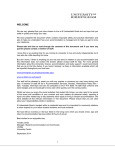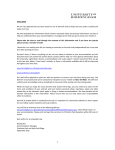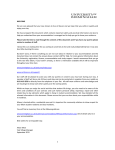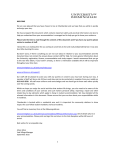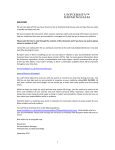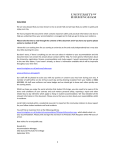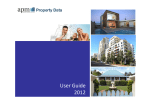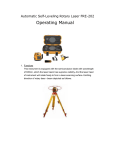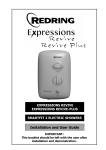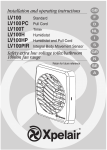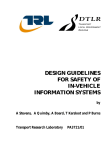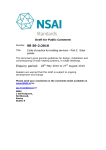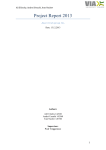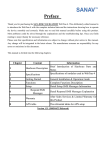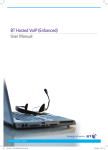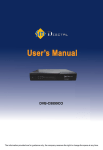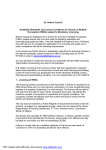Download 1 WELCOME - University of Birmingham
Transcript
WELCOME We are very pleased that you have chosen to live at 37 Oak Tree Lane and we hope that you settle in quickly and enjoy your stay. We have prepared this document which contains important safety and practical information and also to help you understand how your accommodation is managed and to help you get to know your residence. Please take the time to read through the contents of this document and if you have any queries please contact a member of staff. I know this is an exciting time for you coming to university to live and study independently but it may also be a little daunting for some. But don’t worry, if there is anything you are not sure about in relation to your accommodation and this information does not contain the answer please contact staff for help. For more general information about the University, finance, accommodation and study support I would recommend that you go to the links below, if you haven’t already, as there is information available which will be important throughout your time here. www.birmingham.ac.uk/welcome/index.aspx www.as.bham.ac.uk/support/ Our staff will be pleased to assist you with any queries or concerns you may have during your stay. A member of staff will be in Accommodation Services, Monday, Wednesday-Friday 9am – 5pm and Tuesday 10am-5pm and can be contacted on 0121 414 8000. All staff wear uniforms and name badges and we should get to know each other quickly over the coming weeks. Whilst we hope you enjoy the social activities that student life brings, you also need to be aware of the terms and conditions of your contract and such matters as personal safety, reporting a repair and other related day to day elements which apply to living in student accommodation. We have detailed all the relevant information in this document. Please ensure that you are clear about your responsibilities whilst in residence. 37 Oak Tree Lane is located within a residential area and it is important for community relations to show respect for your fellow student residents and local residents. We have left an inventory in the blue folder in the living room which you should check, sign and return to Accommodation Services within 48 hours of arrival. Best wishes for an enjoyable stay. Timothy Owen Manager, Student Accommodation and Community LIVING University Centre September 2014 1 INTRODUCTION 1. What is the Universities UK (UUK) Code of Practice? The Housing Act 2004 introduced licensing for houses in multiple occupation in England and Wales. The Housing Act stated that licensing would apply to student accommodation which replaced the previous system of registration, from which Higher Education Institutions were exempt. The University of Birmingham played an active role in the consultation exercise for the draft UUK Code of Practice. We fully support the principles of the Code for the provision and management of our student residences and signed up to the UUK Code in December 2005 The Code has been prepared primarily to assist managers, and anyone involved in the management of student accommodation by setting out the main elements of good management practice. It is intended that the Code establishes a set of standards and undertakings about our management practices and the relationship between the University of Birmingham and yourself throughout your stay with us. It covers, among other matters, health and safety, maintenance and repair, and relationships between managers and you, our student tenant. It also should assist you to understand both the standards and procedures applying to your accommodation and your obligations as a resident. The Code has been designed with regard to the particular characteristics of student accommodation and to management practice in the higher education sector. Administration arrangements for the Code are set out in this DVD. These are intended to serve the overall purposes of the Code. These help to maintain and enhance standards and to set out clearly what you may expect of your accommodation and its management. These detailed arrangements also provide mechanisms for identifying, and helping remedy, any shortcomings in the management of your accommodation. Where an audit and/or complaints indicate a persistent management failure a University may be deemed to be no longer compliant with the UUK Code of Practice. Arrangements for the management of student accommodation, prior to the introduction of the Code of Practice, varied considerably between universities and the range of professional Higher Education bodies involved in giving information and advice on one or other aspect of housing provision and management of student accommodation. The Code outlines best practice and provides benchmarks for the management and quality of student housing in the Higher Education sector. A full version of the UUK Code of Practice is available to download at www.universitiesuk.ac.uk/acop/ and more details about the Code is available at www.thesac.org.uk/ 2 The Code is concerned with the main principles and essential requirements for well managed student accommodation and the key elements covered by the Code include: health and safety standards and procedures fire safety electricity and gas supplies water supply and services security kitchen facilities and related items maintenance and repair regimes environmental quality landlord and tenant relationship student support antisocial behaviour and disciplinary procedures administration of and compliance with the Code Each of the above elements are detailed under the relevant sections in this DVD. However, some of the information referred to may be held at Accommodation Services or in the Estates Office and instructions will be provided under the relevant heading of how you can obtain this information. If you have any queries or concerns about your accommodation then please contact Accommodation Services where staff will be more than happy to assist you. 2. Health and Safety Standards and Procedures General This Statement is extracted from the University's full Health and Safety Policy Statement which also details the organisation and arrangements for implementing and monitoring the Policy. The full policy statement is available at www.birmingham.ac.uk/university/governance/policiesregs/health-safety.aspx 2.1 Policy Statement 1. The University of Birmingham, as an employer, is committed to providing and maintaining a healthy and safe working environment for all its employees, students and any other people who may be affected by its activities. The overall responsibility for ensuring implementation of this policy lies with the University of Birmingham; that is the University Council and the Vice-Chancellor as its Chief Executive. 2. This statement applies to all premises and activities within the control of the University. The University has made detailed arrangements for implementing this policy outlined in a further section of the Policy entitled, Organisation and Arrangements. 3. In order to achieve this aim the University has the following key objectives: as a minimum, to comply with requirements of relevant legislation; to identify hazards (the potential for harm), assess risks (the likelihood of that harm being realised) and manage those risks; 3 to ensure that employees, students and others are adequately informed of the identified risks and where appropriate receive instruction, training and supervision; to consult with employees' representatives on health and safety matters; to make arrangements for co-ordination and co-operation with other employers where: University employees or students share premises, facilities or activities with persons working in other organisations; persons from other organisations are working in University controlled activities; to safeguard the environment from the effects of the University's activities; to monitor and review the effectiveness of the University's arrangements and where appropriate to implement improvements. to ensure that the demands of activities do not exceed the capabilities of staff or students to carry out the work without risk to themselves or others. 4. The Heads of Budget Centres are responsible for ensuring compliance with University Health and Safety Policy within their area of control. Heads of Budget Centres are required to produce annual health and safety action plans summarising key objectives and timescales. 5. The University will actively monitor the performance of Budget Centres in the management of risks under their control and the implementation of Budget Centre health and safety action plans. 6. Whilst the University accepts the main responsibility for implementation of this policy individuals have an important role in co-operating with those responsible to ensure a healthy and safe working environment. Individuals are required to abide by rules and requirements made under the authority of this policy. Vice-Chancellor December 2001 Hospitality and Accommodation Services Health and Safety Policy To view the HAS Health and Safety Policy please go to www.birmingham.ac.uk/undergraduate/accommodation/Living-with-us/Codeofpractice.aspx 2.2 Risk register The University Health and Safety Policy requires Heads of Budget Centres to ensure that risk assessments are carried out for all activities under their control. “Heads of Budget Centres must ensure that risk assessments are carried out for all activities under their control as required by current University Policies and that appropriate action is taken to eliminate or control the risks identified.” 4 2.3 Emergencies including first aid or calling for the emergency services IN THE EVENT OF AN EMERGENCY ON THE CAMPUS (In the case of FIRE sound the alarm first) IMMEDIATELY, TELEPHONE SECURITY CONTROL ON 44444 OR Use one of the Emergency Phones linked to Security Control Do not telephone the Emergency Services direct. This will be done by Security Control IN THE EVENT OF AN EMERGENCY OFF THE CAMPUS (In the case of FIRE sound the alarm first) IMMEDIATELY, TELEPHONE THE EMERGENCY SERVICES ON 999 AS SOON AS POSSIBLE, TELEPHONE SECURITY CONTROL ON 414-4444 Emergencies include: FIRE, ACCIDENT, ILLNESS, POLICE ASSISTANCE, BOMB THREATS, UNSAFE BUILDINGS, ETC. Emergency phones locations: 1. Elms Road on the corner of the ACS Building 2. South West Campus, Terrace Huts, Sportex Building 3. South Car Park, first floor pedestrian exit, at the rear of the Guild of Students Building 4. University Square, outside Arts Building main entrance (Press button and speak direct to Security Control) EMERGENCY ACTION (ACCIDENTS AND ILLNESS) MAIN CAMPUS In the event of MAJOR ACCIDENT/ILLNESS 1. Check safety - do not put yourself at risk 2. Maintain clear airway 3. Summon Help - see First Aiders listed below Or Dial 44444 - Security 4. Control bleeding 5. Move the casualty as little as possible LOCAL HOSPITAL Queen Elizabeth Hospital Mindelsohn Way Edgbaston Birmingham B15 2WB 0121 627 2000 If you sustain any minor injury, the correct procedure is for you to see an appointed First Aider in order that appropriate action can be taken and the necessary records made. 5 2A. Fire Safety 2.4 Prevention ALWAYS: REPORT ANY BLEEPING DETECTORS TO ACCOMMODATION SERVICES IMMEDIATELY REPORT FIRES OR USE OF EQUIPMENT IMMEDIATELY TO ACCOMMODATION SERVICES REPORT SMOKE OR HEAT ALARM ACTIVATION IMMEDIATELY TO ACCOMMODATION SERVICES MAKE SURE YOU USE THE EXTRACTOR FAN WHENEVER YOU ARE COOKING NEVER COVER DETECTORS LEAVE COOKING UNATTENDED REMOVE THE BATTERY FROM THE DETECTORS MISUSE FIRE FIGHTING EQUIPMENT OR TAMPER WITH FIRE ALARMS – disciplinary action may be taken as detailed in Clause 2.18 of your Accommodation Contract. CLOSE THE GRILL DOOR WHEN IN USE USE FOIL IN GRILL PAN LEAVE FAT or OIL IN GRILL PAN AFTER USE PROP OPEN FIRE DOORS WITHIN THE HOUSE USE CANDLES IN YOUR ACCOMMODATION STORE FLAMMABLE MATERIAL OR LIQUIDS IN THE HOUSE USE HALOGEN LAMPS Please note, there will be charges applicable for the abuse of fire regulations, e.g. for covering up a smoke or heat detector, propping open fire doors or leaving cooking unattended. 2.5 and 2.6 Fire detection and alarm Your house has a combination of smoke detectors in the communal areas and heat detectors in the kitchen and hallway. These are mains operated, backed up by a battery in case of power failure. The alarms are linked which means if one alarm goes off it will activate all the alarms in your house 6 ALWAYS TREAT AN ALARM ACTIVATION AS A POTENTIAL FIRE AND NOT A FALSE ALARM IT COULD SAVE YOUR LIFE! If your house alarm is activated by a fire or any other reason always contact a member of Accommodation Services staff ACTION IN THE EVENT OF A FIRE 1. RAISE THE ALARM BY SHOUTING FIRE 2. DIAL 999 on any telephone and give details to the Emergency Services 3. REPORT incident to Accommodation Services/Security staff immediately 4. ATTEMPT to extinguish the fire with the appliances available (BUT DO NOT PUT YOURSELF AT RISK) 5. EVACUATE THE HOUSE For information on emergency action in relation to accidents and illness on main campus go to https://intranet.birmingham.ac.uk/has/security/Who-to-contact-in-an-emergency.aspx TESTING REGIME The following are regularly tested to the appropriate British Standard by the Estates Office Emergency lighting Emergency secondary power supplies, such as battery back up systems Fire door integrity including closures Automatic door release systems 2.7 and 2.8 ESCAPE To evacuate your house you must leave via the ENTRANCE door. Proceed down the stairwell (if you are not on the ground floor) and go straight outside using either the front or rear door (depending where the fire is) It is important that the corridors and stairwells are kept clear of rubbish or obstructions at all times, safe egress will be monitored regularly by staff. Deliberate obstruction by rubbish or other items will be seen as a major breach of Health and Safety regulations and disciplinary action may follow RULES FOR EVACUATION YOUR RESPONSIBILITIES ACTION TO TAKE ON HEARING THE ALARM Leave the house by the shortest and safest route Call 999 7 2.9 Personal evacuation plans Residents are encouraged to disclose details of any disability which may affect their ability to complete a safe evacuation in an emergency and thus require assistance from Village staff. We would encourage you to advise us of any relevant disability to enable staff to prepare a personal emergency evacuation plan (PEEP) for you. Why would you need a personal emergency evacuation plan? A Personal Emergency Evacuation Plan (PEEP) is designed to ensure the health and safety of yourself should an emergency situation arise that requires building evacuation (e.g. fire alarm activation, bomb threat). This plan is usually unique to yourself and stipulates the actions you will need to take and any requirements that staff will need to be aware of should an emergency arise. It will cover all buildings you are likely to occupy whilst in the accommodation. If this is something you would like to discuss in confidence please contact the Accommodation Services staff 2. B. ELECTRICITY AND GAS SUPPLIES 2.10 General Please be aware UK STANDARD VOLTAGE IS 230v 50hz Except in the case of emergencies or essential maintenance works electrical supply will be maintained without interruption. 2.12, 2.13 and 2.14 All gas appliances in Student Accommodation, such as boilers, have an annual gas safety check undertaken by a Gas Safe registered gas installer. These tests are coordinated by the Estates Office and you will find a copy of the current gas safety check displayed next to the gas appliance in your accommodation. 2.15 Electrical Installations Guidelines Do not use any appliance rated at any other voltage especially 110V as this is a serious Health and Safety risk and may result in disciplinary proceedings You must check that your own electrical appliances are made to British Standard and are wired correctly. Seek advice from Accommodation Services staff if you are unsure. The University reserves the right to remove any unsafe or faulty electrical appliances found in your Accommodation. Students can reclaim these from Accommodation Services when they move out of the Accommodation. When using personal electrical equipment i.e. Kettles, Toasters, Hairdryers etc… Please make sure that you follow the guidelines below: All personal electrical equipment must be serviceable - this includes connecting cables 8 and plugs. The use of halogen lamps is not permitted under the terms and conditions of your Accommodation contract. Plugs must be wired in the correct manner and fused according to the manufacturer's instructions. One plug must supply one appliance only. Cables must not trail across the floor. If extension leads or long cables are used, these must be placed neatly so as not to cause a trip hazard. DO NOT place containers of liquid near electrical equipment. Report any broken/faulty electrical sockets to Accommodation Services immediately. You are responsible for any electrical equipment you bring into your flat. The University takes NO RESPONSIBILITY for damage or injury caused by personal equipment in your Accommodation. To make sure that the electric circuits to your flat do not 'TRIP OUT' i.e.: switch off, please comply with the following: Do not use more than one rice cooker at the same time Do not use voltage adaptors purchased overseas Do not use a light bulb with a wattage in excess of 60 watts Do not use dirty appliances We advise you DO NOT buy re-conditioned electrical items without having a Portable Appliance Test (PAT) carried out and displaying the appropriate certification on it. 2.16 Electrical safety certificates All electrical installations within Student Accommodation are inspected and tested in accordance with the IEE Regulations, currently at least every 5 years. General Information relating to UK electrical power supply UK standard plugs have three rectangular pins that form a triangle. British Standard BS 1363 requires use of a three-wire grounded and fused plug for all connections to the power mains (including Class II, two-wire appliances). UK power outlets incorporate shutters on line and neutral contacts to prevent someone from pushing a foreign object into the socket, such as a 2 pin plug. The UK domestic electrical system uses a ring circuit in the building, which is rated for 32 amps (6 amps for lighting circuits which are usually spurs). Moreover, there is also a fusing in the plug; a cartridge fuse, usually of 3 amps for small appliances like radios etc. and 13 amps for heavyduty appliances such as heaters. 9 Almost everywhere else in the world a spur main system is used. In this system each wall socket, or group of sockets, has a fuse at the main switchboard whereas the plug has none. So if you use a foreign appliance in the UK, you must use an adaptor that incorporates the correct value fuse. Note most would have a 13 amp as standard. 10 11 12 13 2.12 Portable Appliance Testing (PAT) What is PAT? Portable Appliance Testing requires that all portable appliances with a mains plug need to be tested to ensure that they are safe and fit for purpose. Appliances include, but are not restricted to, the following examples: Computers, monitors and peripherals requiring mains power Audio and telephone equipment requiring mains power Kettles, microwave ovens and other kitchen appliances Vacuum cleaners Extension leads Any portable appliances supplied by, or used in the premises by University staff, are inspected and maintained in accordance with the University’s Electrical Safety Policy. This can be viewed at https://intranet.birmingham.ac.uk/hr/wellbeing/worksafe/topics/electrical.aspx 2.19 and 2.20 It is a requirement that you should keep your Accommodation clean and tidy so as to provide reasonably safe environment for all staff who may have to enter your Accommodation, as detailed in Clause 2.3 in your Accommodation contract 2.21 Water Supplies General All bathrooms and kitchen areas are supplied with separate hot and cold running water to appropriately marked taps. The cold water supply is drinkable in both kitchen and bathroom. It is advised if you have been away from your residence for more than a few days that you turn on the cold water supply and let it run for a little while before use. If any supply is deemed to be undrinkable this will be clearly marked as such. 2.22 and 2.23 Waste water All waste water is removed via an appropriate trapped connection to the sewerage system. 2.24 Lighting Lighting is provided in accordance with the Chartered Institute of Building Service Engineers (CIBSE) recommendations. If you have any queries regarding lighting levels please contact reception who will try to resolve any concerns you may have. 14 2C. Security 2.25 Building and room security DO NOT PROP THE FRONT DOOR OPEN. Always lock all doors before leaving the house. Staff will contact residents if doors are found open. 2.26 All ground and first floor windows to your house are lockable and fitted with stops to prevent over-opening. Staff at Accommodation Services try to ensure that the site is as safe as possible, however. it is therefore the responsibility of every resident to follow the above recommendations to help maintain a safe environment for residents. Further information can be found at www.homeoffice.gov.uk/crime-victims/how-you-can-preventcrime/student-safety which is a useful web site providing tips and advice for students provided by the Home Office. Accommodation Services respects your privacy and 24hrs notice will be given to residents whenever possible regarding access to study rooms (Exceptions in emergency situations or when other residents may face Health and safety issues or suspected criminal activity) If you think someone has entered your room without authority please contact reception immediately. You have signed for a front door key and a bedroom key. They are your responsibility and must not be passed on to friends or visitors. Always keep the doors locked and your keys with you. The entrance door to your room and house does not lock automatically when you close the door behind you. You will need to lock these doors when you leave the house 2.27 Security Personnel University security staff are identifiable by their corporate uniform and all wear University ID badges. All security staff have been vetted by the current and relevant legislation. Campus Security Security Control Room Tel: 43000 e-mail: [email protected] Confidential Crime Line Tel: 47500 Emergencies Tel: 44444 Fax: 47596 Location Security are based in the Security Centre Building, which is situated between Aston Webb 'B' Block and the Great Hall (building number 3 on the campus map) and can be reached either from the Aston Webb semi circle lower ground floor or directly off the ring road. Security policy Security will almost always be the first public face of the University of Birmingham that a visitor will see. Therefore, the Section works to the principle of providing a welcoming, friendly and helpful service to visitors and others entering the campus. 15 Security provides the first line of protection for the people, the buildings and the land of the University. It encompasses all aspects of the University's day to day business on and off site. Security maintain a 24-hour, 365 days a year presence throughout the Edgbaston and Selly Oak campuses, all main student residences and some non-residential outlying properties. Security provides this coverage through 5 teams working a continuous shift system, in contact with their base via radio. For more information relating to University Security please go to www.has.bham.ac.uk/support/securityteam/ Security Plan For information on safety on campus and details of the University’s Emergency Management Plan please go to: www.birmingham.ac.uk/community/university-campus/security/index.aspx https://intranet.birmingham.ac.uk/has/Emergency-Planning-and-Management/Emergencyplanning.aspx 2.29 Closed Circuit Television (CCTV) Policy and guidance The University complies with current government standards regarding CCTV use on campus and under the provisions of the Data Protection Act 1998, if you wish to see an image(s) of yourself you need to submit a “subject access request” in writing to the Information Compliance Manager in Legal Services. The Information Compliance Manager will decide whether the image(s) is/are still in existence and whether to release the image(s). There is currently a charge of £10 for this service and you should include a cheque for £10 payable to “The University of Birmingham” with your “subject access request”. A copy of the University’s Data Protection Policy is available at www.birmingham.ac.uk/university/governance/policies-regs/data-protection.aspx A copy of the University’s Codes of Practice, including CCTV Code of Practice www.birmingham.ac.uk/university/governance/policies-regs/codes-practice.aspx 2D. Kitchen facilities, food storage, washing facilities, furnishings and other matters furnishing, cleaning routines and other matters 2.30 Kitchen and food hygiene advice The facilities within your kitchen should be maintained in good order and repair with all equipment supplied in working order. If when you move in you find that any item is defective or missing 16 please record this on the Inventory Form which has been left in the blue folder in the communal area. If you cannot find the form please contact a member of Staff in Accommodation Services. Washing your hands is important Some germs can stay alive on our hands for up to three hours and in that time they can be spread to all the things you touch - including food and other people. So wash your hands regularly throughout the day and especially at these times. Remember germs spread more easily if hands are wet Always wash your hands before Preparing food Eating Always wash between: Handling raw foods (meat, fish, poultry and eggs) and touching any other food or kitchen utensils Always wash after: Handling raw foods, particularly meat, fish, and poultry Going to the toilet Touching refuse/waste bins Coughing or sneezing, especially if you are unwell The number of germs on fingertips doubles after using the toilet KITCHEN & COMMUNAL LOUNGE AREA COOKER HOT PLATE (top) When cooking, do not leave food unattended, stay in kitchen After cooking, clean away any spillages removing any grease with a cloth or scourer and cream cleanser and rinse with a damp cloth Do not leave the cooker top dirty for the next person Switch cooker off after use to prevent the risk of fire and save energy 17 GRILL (middle) Do Not shut grill door when in use Do not use aluminium foil in the grill pan Clean the grill pan in hot soapy water to remove grease after use - (excess fat or oil can catch fire) OVEN (bottom) Never cook food on the metal racks in the oven without using an ovenproof dish, plate or tray Clean all spillages after use with a cloth or scourer and cream cleaner and rinse with a damp cloth FRIDGE/FREEZER Do not over fill fridge or freezer with food Throw away unwanted or out of date food regularly Clean up any spillages inside and out with a cloth VACUUM CLEANER MOP & BUCKET DO NOT use a vacuum cleaner to clean up any liquid spillages (use a mop & bucket) Use a vacuum cleaner on all carpeted areas Remember to empty the vacuum cleaner bag regularly Use a mop & bucket to clean vinyl flooring in the bathroom & kitchen WORK SURFACES AND SINK AREA After preparing meals, wipe all surfaces clean DO NOT leave worktops, dining table dirty for the next person DO NOT put HOT pans straight on to worktops, dining table or window sills (damages will be charged for) Use rice cookers away from under wall cupboards, steam can cause damage to the cupboards Wash all crockery items after use, using washing up liquid, dry and put away in cupboards provided DO NOT pour grease, fat or food (rice & noodles) into the sink 18 DO NOT leave sink, drainer, worktops cluttered with bottles, pans, jars REFUSE BINS Always use a black bin liner in the kitchen refuse bin and keep the lid down to reduce smells Throw all waste food in refuse bin Empty refuse bin when full and place in external bins provided on site Wash bin inside and out after removing rubbish to sanitise Remember that rotting food waste will smell and cause germs. Remove from the kitchen regularly REMEMBER: BE CONSIDERATE TO YOUR FLATMATES 2.31 Food Storage Cold storage (fridge and freezer) is provided in your kitchen Cooking on a Budget Shop Smart – make sure you don’t buy more food than you can use, stop waste and save your money Make a list and stick to it – only buy what you need and resist those special offers not on your list Buy basic ingredients and make your own meals – it is cheaper and healthier Say no to carrier bags – Reuse your carrier bags or buy some “bags for life” and use these each time you go shopping Rather than all of you shopping individually why not bulk shop together as a household, it will be cheaper, offer you more variety and taking it in turns cooking means you won’t have to cook for yourself every night! Cooking as a household will save you time and reduce the amount of energy and carbon emissions produced from cooking one large meal for everyone rather than a number of small individual meals If you shop together as a household it will be cheaper and more environmentally friendly if you shop on-line as a household and have the goods delivered to your door Shop seasonally and save on Food Miles. It is obvious that in the winter months you will pay much more for summer produce flown in from the other side of the world Plan your meals so you are not forced to throw away out of date food 19 The average person in the UK throws away over £400 worth of perfectly good food each year 2.32 Bathroom, Toilet and Shower areas Info/Advice required It is important you report any cracks in sanitary ware, or problems as soon as possible to maintain standards and prevent any Health and Safety issues developing. BELOW ARE SOME HELPFUL CLEANING TIPS TOILET Always flush toilet after use Toilet paper can be flushed down the toilet Clean inside the toilet with brush (provided) and toilet cleaner Clean toilet seat and exterior of toilet with a cloth WASH HAND BASIN Clean inside and out using a cloth or sponge and cream cleaner Clean under and around taps Ensure that plughole/outlet is free of hair( report to Reception if water not draining away) Do not throw any food away (rice/noodles) down the sink. Clean tiled area and any shelving and mirrors SHOWER Clean shower or bath with cloth or sponge and cream cleaner after use Remove hair from plughole/outlet regularly (report at Reception if water not draining away) Regularly clean flooring, using an all purpose cleaner and a mop Wash the shower curtain regularly Please remember DO NOT use the following to clean your toilet, wash hand basin or shower BLEACH WASHING UP LIQUID SOAP POWDER These items will NOT help clean the above areas and may cause damage 20 2.33 En-suite facilities are not available in your accommodation 2.34 Furnishing quality When you move into your accommodation it should be clean and in good repair if you are not satisfied with the condition of your room or kitchen area, please indicate your concerns or defects on the Inventory Form or contact Accommodation Services immediately Your house is equipped with the following: GENERAL ITEMS Item Carpet on stairs Carpet on upstairs landings & Carpet on gr. fl. hallway & TV aerial point Telephone point A wall-mounted notice board A door bell Coat hooks in hallway Vacuum cleaner with hand tools An ironing board A clothes airer A washing line + hooks / line Iron Shed / garage No. Description / Condition Yes Yes Tiles Lounge Lounge 1 1 1 1 1 3 1 1 Outhouse KITCHEN Item Electric sockets Fridge/freezer of adequate Cooker Heating Blind 30 min. Firecheck door Door closing device Window locks on openable Lampshade A fire blanket A mop and bucket A dustpan and brush A kitchen waste bin A broom No . Description / Condition Yes Statesman Legacy statesman - gas Radiator 1 1 1 Yes Yes Yes 1 1 1 1 1 1 21 BATHROOM Item An automatic electric extractor A Shower A shower cubicle Adequate towel rails Adequate shelf or cabinet space Cabinet Lampshade A toilet brush and holder Window locks on openable No. 1 1 1 1 Description / Condition Xpelair Window sill 1 1 1 Yes COMMUNAL LIVING / DINING ROOM. Item Carpet Heating Dining table. Dining chairs Sofa Coffee table Blind Lampshade Electric sockets. Door closing device Window locks on openable STUDY BEDROOM 1 No. Description / Condition Yes Radiator 1 4 2 1 1 1 Yes Yes Yes Location Downstairs, front Item Bed base (minimum 3ft) Mattress Wardrobe (minimum rail length Chest of drawers / dressing Desk / table ( min. 2 x 3 ft) Study chair Bookcase / bookshelves Metal waste paper bin. Mirror (fixed). No. 1 1 1 1 1 1 1 1 1 Lampshade 1 22 Description / Condition Blind Carpet. Heating Electric sockets. Wall-mounted notice board Window locks on openable STUDY BEDROOM 2 Yes Radiator Yes 1 Yes Location Upstairs, left, front Item Bed base (minimum 3ft) Mattress Wardrobe (minimum rail length Chest of drawers / dressing Desk / table ( min. 2 x 3 ft) Study chair Bookcase / bookshelves Waste paper bin. Mirror (fixed). Lampshade Blind Carpet. Heating Electric sockets. Wall-mounted notice board STUDY BEDROOM 3 1 No. 1 1 1 1 1 1 1 1 1 1 1 Description / Condition Yes Radiator Yes 1 Location Upstairs,1st right, back Item Bed base (minimum 3ft) Mattress Wardrobe (minimum rail length Chest of drawers / dressing Desk / table ( min. 2 x 3 ft) Study chair Bookcase / bookshelves Metal waste paper bin. Mirror Lampshade Blind Carpet. No. 1 1 1 1 1 1 1 1 1 1 1 Description / Condition Yes 23 Heating Electric sockets. Wall-mounted notice board Window locks on openable Door closing device STUDY BEDROOM 4 Radiator Yes 1 Yes Yes Location Upstairs, 2nd right, back Item Bed base (minimum 3ft) Mattress Wardrobe (minimum rail length Chest of drawers / dressing Desk / table ( min. 2 x 3 ft) Study chair Bookcase / bookshelves Waste paper bin. Mirror (fixed). Lampshade Blind Carpet. Heating Electric sockets. Wall Mounted notice Window locks on openable Door closing device No. 1 1 1 1 1 1 1 1 1 1 1 Description / Condition Yes Radiator Yes 1 Yes Yes 2.35 Cleaning Your responsibilities You are responsible for cleaning your own room/en-suite, and have joint responsibility for the kitchen/hallway. We recommend you agree with your flatmates a cleaning rota for removal of rubbish, cleaning cooker etc… as soon as possible after you move in Always use a black bin liner in the kitchen refuse bin. (Not supplied) Remember to clean and tidy up when you have used the kitchen as others have to use it too If standards of cleanliness are repeatedly unacceptable, contract cleaners may be brought in and residents recharged for the cleaning work. Please note that the shower curtain should be washed and dried on a regular basis 24 2.37 Energy We would ask you to be sensible with regard to your usage of gas, electric and water to help reduce the impact on the environment and to help the University keep its carbon emissions and energy costs to a minimum. You should try to help us conserve energy and not use these services in a wasteful manner. 2.38 Post and Mail Post will be delivered directly to your address which is: 221 Harborne Lane, Selly Oak BIRMINGHAM B29 6TG 3. Internet Facilities are not included with your accommodation package 37 Oak Tree Lane Selly Oak BIRMINGHAM B29 6JE 4. Maintenance and Repair Regimes 4.1 Approved contractors Where the University is directly responsible for repairs and maintenance these will be carried out by appropriately identified University employed staff or external contractors from the University’s approved list held by the Estates Office 4.2 Repair response times When you report a fault, it will be given a priority, which is based on the seriousness of the problem, as follows: Priority 1 Emergency: Response immediate Works if not carried out immediately will endanger the health and or welfare of staff, students, public etc. Examples: Failure of an essential service e.g. electricity, heating, emergency lighting to public areas, severe water leak or no lighting in whole flat Immediate response 25 Priority 2 Urgent: Response Within 24 hours Urgent or essential work which does not present an immediate threat as above, but which if not attended to within a 24 hour period could, or result in a call-out outside normal hours. Examples: No heating or hot water to specific areas, blocked storm or foul drains, no lighting to specific areas Priority 3 Response Within 5 Working Days Work if not carried out within 5 working days could result in the quality of the service provided, further deterioration or additional costs or inconvenience Examples: Overflowing external gutters, shower waste draining slowly or toilet seat loose or no power at socket, door re-hanging Priority 4 Response Within 10 Working Days Work of a non-urgent nature that can be planned in advance Examples: General plastering, tiling or replace cooker extractor bulb and most planned maintenance items Priority 5 Response As Agreed With Users Work on a defect which has been programmed for a date in the future because access may not be available or awaiting parts Examples: Internal decoration programmed in to a planned maintenance schedule Reporting repairs Please report any faults or damage immediately to Accommodation services, either by phone email [email protected] or in person. We will pass the work on to the University’s Estates Office or an outside contractor if specific skills are required. This may delay response times, however, you will be informed if this is the case. When an outside contractor is required they will be supervised whilst in your Accommodation. Please do not authorise any contractors to do repairs without written permission from Accommodation Services or you may be held responsible for paying the bill. If additional damage is caused to the Accommodation due to failure to report defects and repairs promptly, additional charges may be incurred for which you might be held responsible Please note the priorities above assume there is no urgent Health and Safety issue involved. In some cases the fault may be referred to the Estates Office or another outside contractor. When this is the case it may not be possible to meet the above response times. You will however be informed of any delays and if you have any concerns regarding timescales please contact reception. 26 Repairs can be carried out when you are not in your room with your permission and a note will be left giving you information on the completion of the repair. 4.3 Maintenance All maintenance works should be undertaken so as not to inconvenience you. This will not always be possible with unplanned or reactive maintenance. For planned maintenance seven days notice should normally be given to you and endeavours will be made to avoid sensitive periods, such as during examinations. For urgent work the minimum notice period should be 24 hours unless an emergency requires immediate action. Pest Control If you have any concerns regarding pests in or outside of your accommodation please report these to Accommodation Services in The University Centre – 0121 414 8000 and a specialist contractor will be instructed to attend to deal with appropriate treatment. The contractor will attend to investigate within 24 hours of the report being received and will carry out appropriate treatment for the pest or infestation. General Repair Information You may notice the above label in your flat or in buildings on the Edgbaston and Selly Oak campuses. The purpose of the labels is to advise any contractors who need to work in these locations to contact the Estates Office to seek appropriate information and advice before commencing any maintenance or repair work. In areas where there is a label present if you see signs of any damage to walls, ceilings or services please report this to Accommodation Services immediately. 4.4 Construction quality All student residences have been properly constructed, altered or refurbished and maintained in accordance with the appropriate building, planning and housing legislation current at the time of construction. 27 4.5 Grounds maintenance All planting and fences around residences will be maintained to be tidy and to minimise opportunities for concealment of intruders. Grounds maintenance is the responsibility of the University’s Grounds and Gardens Section. The presentation of the campus setting is down to their efforts and dedication. Covering both campuses, outdoor sports facilities, residential sites and outstations means they manage 180 hectares of land being responsible for grass cutting, planting, pruning, tree work, litter and road sweeping. In addition to this, 8000 annual bedding plants are replaced twice per year and oversee the interior planter contract. Their activities create up to 400m³ of green waste every year, which we recycle into compost. 4.6 Litter clearance on campus Grounds on campus will be regularly cleared of rubbish and litter picking will take place daily whenever possible (weather permitting). Students will be expected to behave responsibly and to avoid causing, or adding to, litter. The respective service level agreement is detailed below: Service Provision for the Landscape Maintenance provided by Grounds and Gardens Litter Picking and Sweeping a) All campus sites will be cleared of litter utilising a manual and mechanical means. All areas will be serviced and cleared in a priority order and the operators will also be responsible for the emptying of litterbins as required. b) All areas as detailed will be serviced on a daily/weekly schedule and the majority of this work will be completed during early mornings. c) All sites are constantly monitored on a daily basis. d) Any problems associated with the cleanliness of any external areas within the grounds should be reported to the office for the appropriate action. Details that may be required are description of problem and location. If you have concerns regarding litter or rubbish accumulation, please contact Grounds and Gardens 4.7 Snow and ice clearance policy (Campus) For information on the snow and ice clearance policy please see below: Gritting, Salting and Snow Clearing a) We will provide a comprehensive gritting and salting service during periods of inclement weather; this will be actioned as required over all campus sites. Snow 28 clearing will also be carried out in addition to the above as required utilising manual and mechanical means by direct labour and all contractors. b) All areas as detailed will be serviced on a prioritised schedule and the majority of this work will be completed during early mornings, while still reactive to prevalent weather conditions. Priority will be given to main routes to campus for emergency access, vehicles and pedestrians c) All areas will be monitored on a daily basis to ensure that the priority order is maintained and that all additional requests for assistance are serviced. Any problems associated with the clearance of external areas should be reported to Grounds and Gardens for the appropriate action. 5. Environmental Quality 5.1 Energy efficiency The Utilities section within the Estates Office is dedicated to generating, procuring, managing and controlling the University’s expenditure and use of energy, water and thus emissions of greenhouse gases. The University’s annual expenditure on energy and water is around £9M and results in the production of approximately 50,000 tons of carbon dioxide. Approximately half the electricity and most of the heat the University uses is produced by its own Combined Heat and Power Plant (CHP). It is distributed via the University’s own network of district heating pipes and private electrical network. In the last ten years, the University has reduced its consumption of water and gas and contained its consumption of electricity while student numbers have virtually doubled. In order to broaden this initiative the University of Birmingham, along with 19 other universities, has signed up to the Higher Education Carbon Management Programme and has committed to a reduction of 10% compared to business as normal. For more information on the Carbon Trust go to www.carbontrust.com/home By recycling and cutting the amount of energy they use, residents can help us reach this target. Concerned about climate change? Want to do your bit to help cut greenhouse gas emissions? If yes, why not start by being more energy efficient in your residence TODAY? In 2003 in the UK, the energy we used in our homes produced almost a third of the carbon dioxide emissions entering the atmosphere. Carbon dioxide is one of the main contributors to the man-made ‘greenhouse’ effect, where by heat from the sun is trapped in the atmosphere and results in an increase in the temperature of the Earth – global warming. 29 The great news is that you don’t have to spend any money to help save energy and reduce carbon dioxide emissions. Saving energy will also help reduce fuel bills - you may not pay directly for these now, but may well do in the future when gas and electricity prices are even higher! Follow these simple tips to save energy and money, now and in the future: Turn electronic equipment off standby and remember not to leave cordless phones on charge unnecessarily. More of us than ever have consumer electrical products like personal computers, DVD players, set top boxes etc. Households in the UK now spend around 10% of their electricity bill on standby power, wasting £37 each year. Do your bit and turn your computer, television, DVD player and all other electrical products off at the wall when not in use! NB: please check the user manual first. Only heat the amount of water you really need when boiling a kettle If we all did this instead of “filling” the kettle every time, we could save enough electricity in a year to run nearly half of the street lighting in the country! Have control over your heating? Is it too warm? Turn the thermostat down by 1ºC. Boilers used in home heating systems account for 60% of household carbon dioxide emissions. Where you have control over your central heating system turning the thermostat down by 1 degree will reduce energy use and help cut heating bills by up to 10%. Not sure what to look for? Contact [email protected] for advice and information. Don’t leave fridge doors open for longer than necessary as cold air will escape Also avoid putting hot or warm food straight into the fridge, allow it to cool down first, and defrost your freezer regularly to keep it running efficiently and cheaply. If your freezer tends to frost up quickly, check the door seal. Always wash a full load in your washing machine or if you can’t, use a half-load or economy programme Use a low temperature programme, as most modern washing powders will be just as effective at lower temperatures. If you are using a tumble dryer, wring out or spin-dry really wet clothes before putting them in - this will save you money, and help them dry faster. Don’t throw money down the drain - always put the plug in your basin or sink when running hot water Close your curtains at dusk to stop heat escaping through the windows Always turn lights off when you leave a room and adjust your curtains or blinds to let in as much light as possible during the day. 30 In most homes, lighting accounts for 10 – 15% of the electricity bill and a 100W light bulb left on for just 30 minutes creates enough CO2 to fill a party balloon. A great source of further information and advice is the energy saving trust website, go to www.energysavingtrust.org.uk/ What is the University doing about Climate Change? Along with many research and teaching activities aimed at solving the challenges of climate change, the University is keen everyone can play a part. Most of the University’s carbon emissions are from energy production. We have our own efficient gas turbines on the main campus, which produce heat and electricity. Energy conservation can have a major impact on reducing our carbon footprint. Birmingham along with nineteen other Universities has been working with the Carbon Trust to quantify our emissions of Carbon Dioxide and prepare a plan to reduce emissions from campus activities. The University’s Carbon Management Implementation Plan, which was approved by the Vice Chancellor and senior management team, has identified various cost effective projects to reduce these emissions and give an absolute saving of 6% of the University’s carbon emissions over a five year period. https://intranet.birmingham.ac.uk/collaboration/environment/carbon/CollegeCorporatePlans.aspx 4.2 Refuse collection It is your responsibility to collect all your refuse in black refuse sacks and place these at the front of your property on the specified dates. Refuse is collected from your street on a weekly basis by Birmingham City Council on a Thursday. 4.3 Recycling For more information on recycling provision provided by Birmingham City Council please go to www.birmingham.gov.uk/recycling The University is committed to reducing the environmental impact of all areas of its operation, including student residences. The University’s Environmental Policy https://intranet.birmingham.ac.uk/collaboration/environment/policy/index.aspx The University and the Environment 31 5.4 Recycling Tips Good luck with your move in to you new home – recycling starts here: Recycle or re-use the packaging you have just used to bring your personal possessions to university. Flatten those cardboard boxes and recycle them at the recycling points on your Student Village or store them in your room for reuse at the end of the academic year Check at reception for details of what products you can recycle If a glass bottle can be returned then return it. If not, then recycle it. Please try to use the bottle banks during the day to avoid disturbing our neighbours and the local community Choose products in packaging that you know can be recycled Wherever possible buy products made from recycled materials Avoid heavily packaged products like ready meals and convenience foods for your health and the environment. If you buy them recycle the packaging Purchase loose food rather than pre-packaged, it is usually cheaper and better for the environment than packaged goods Use an air tight plastic container for your packed lunch rather than disposable wrapping, cling film or aluminium foil Choose rechargeable items over disposable ones, such as batteries and cameras If you are buying new electrical items check their energy efficiency and choose an A rated product Think before you print. Read e-mails, work etc on screen and store it electronically on your PC, only print if absolutely necessary Where available, set the default printing settings on your PC to double-sided or print two pages on one Reuse scrap paper by using the unused side and recycle the paper when finished with it. Please be careful, shred any paper which may contain personal, financial or other confidential details and then recycle Use notebooks made from recycled paper for your lecture or tutorial notes or even better and cheaper make your own from scrap paper Reuse envelopes by placing sticky labels over the original address Please help us to help the environment Do your bit - Recycle it! 32 5.5 Good Neighbour Policy Please be aware that you are living in a residential area and that residents on North Road are shown consideration particularly at night. Your contract with the University (Clause 2.12) clearly states: "Not to cause nor allow your visitors to cause any disturbance or inconvenience to other student occupiers of the House or the owners or occupants of neighbouring premises” Please report any noise or disturbance issues to Accommodation Services. All information given will be logged and will be treated with strict confidence. The sooner we know of a problem the sooner we can help. Some examples of anti social behaviour include, but are not restricted to: Music played loud during the night (repeatedly) Slamming doors late at night Frequent noisy parties Groups of residents/visitors talking loudly and being noisy etc. A member of staff will investigate the complaint and decide what action to take, such as requesting the music be turned off. Please be advised that repeated complaints which result in university security officers attending site could lead to disciplinary action or Notice to Quit your Accommodation. 6. Landlord and tenant relationship 6A. Policies and Procedures Residence fees Below is an extract from the Accommodation contract which describes how your residence fees can be paid. The residence fee increases are discussed and agreed by representatives of Hospitality and Accommodation Services To pay the residence fee without deduction or set off in accordance with the payment terms set out in the Payment Form annexed forming part of the appendix. If the Residence fee or other monies due and payable remain unpaid for 21 days after becoming payable (whether formally demanded or not), or in the event of any other breach of this Contract on the part of the Student, then it shall be lawful for the University or any other person on its behalf to take court action to recover possession of the Accommodation but without prejudice to any right of action or remedy of the University in respect of any antecedent breach or non-performance of any of the student' 33 Termination and cancellation of contract If the student wishes to leave the accommodation during the Contract Period, then they may only do so where they find a replacement who is a full-time registered student of the University (who is not already living in University Accommodation) to move into the Accommodation for the remainder of the contract period and to inform the University’s Accommodation Office of such proposed arrangement, BEFORE it is finalised. The Student will remain liable for the entire Residence fee until such time as the University has formally released the Student from their accommodation Contract, following their replacement having signed an Accommodation Contract for the Accommodation for the remainder of the contract period. The student will be required to vacate the Accommodation if they withdraw from their studies and cease to be a registered student OR in the event that the Student is granted a formal leave of absence from the University (upon receipt of the University’s notice to vacate) OR if the Student commits serious or persistent breaches of this Contract (upon receipt of the University’s notice to vacate). In such cases one month’s rent in lieu of notice or until the room is re-let, whichever is the earlier. Complaints We aim to provide you with a high quality service and we take a positive approach to all complaints received and view them as feedback from our customers. Complaints provide Student Accommodation with valuable information that allows us to assess our standards and performance in order to review our policy and procedures to improve service delivery. A complaint can be summarized as an expression of dissatisfaction with the standard of service or a lack of action that affects those customers using the service. A complaint can be summarized as an expression of dissatisfaction with the standard of service or a lack of action that affects those customers using the service. If you would like to make a complaint please go www.birmingham.ac.uk/undergraduate/accommodation/Living-with-us/Codeofpractice.aspx download a complaint form and complete and return to Reception to and For the Complaint Policy and Guidance please go to www.birmingham.ac.uk/undergraduate/accommodation/Living-with-us/Codeofpractice.aspx click on “Guidance Notes” Concerns, Comments and Suggestions and If you would like to contact us to raise a concern, make a comment or suggestion rather than lodging a complaint we would be keen to hear from you. Please go to www.birmingham.ac.uk/undergraduate/accommodation/Living-withus/Codeofpractice.aspx and click on “On-Line Accommodation Feedback Form” complete and submit the on-line form. 34 Access to bedrooms The University reserves the right to enter and search your Accommodation with the consent of the Accommodation Manager or equivalent, in the interests of safety, health or the maintenance of law and order or to carry out essential repairs or maintenance. We will carry out a routine inspection of your Accommodation at least termly. If access is required to inspect your Accommodation you will be given at least 24 hours notice in advance. Forgotten your keys If you lose your keys out of office hours please contact Security on 0121 414 3000. Security will contact the On Call person who will come out to you and let you in. There is a £30 charge for this call out. Lost or damaged keys Please report these to Accommodation Services immediately’. Replacement keys can be obtained from Accommodation Services and will only be issued after payment is received. Please note, if a lock is damaged and needs to be changed, there will be a minimum charge of £75.00. Returning keys Please return your keys to Accommodation Services where they will be signed in. If reception is closed, place them in an envelope with your address and room number and hand into Security. We do not recommend that you leave keys with friends to return as charges will be made for late or non return of keys. 6B Communication between Management and student So that prospective students may make informed decisions on their choice of accommodation we provide clear and accurate information on student accommodation covering the following key areas: Eligibility to apply for University accommodation Application forms appropriate to the type(s) of accommodation available and an on-line application facility The application process for residential accommodation Charges applicable to each room type and payment terms Length of the contract period for each residence Contract terms and conditions for University accommodation Details on the use of cars and the provision of car parking and cycle storage These details and more are available on the Student Accommodation web site at www.birmingham.ac.uk/undergraduate/accommodation/Living‐with‐us/Living‐with‐us.aspx 35 6.1 Management Structure and contact details Management structure – Student Accommodation Living ‐ Contact Monday, Wednesday-Friday 9am – 5pm and Tuesday 10am-5pm 0121 414 8000. 6.2 Insurance The University will not be liable for injury or the loss of, or damage, to any personal property in University accommodation except in cases of negligence on its part. Personal possessions insurance cover is provided within your residence fees. You are required to familiarise yourself with the cover provided by the insurer (as set out in their documentation supplied to you) and to arrange for additional cover, where required, yourself. Please note that cover is only provided for the Accommodation Period. You should report non-receipt of the relevant insurance documentation to Accommodation Services and the documentation will be forwarded to you. 36 The personal possessions insurance which is included in your residence fee is core cover insurance with Endsleigh Insurance. Insurance cover is only provided for the accommodation contract period which applies to your Accommodation. Details of cover and the policy are provided in your accommodation offer pack. For further details regarding what core insurance cover is provided and whether you wish to extend the cover please go to www.endsleigh.co.uk/personal/home-insurance/review-student-cover/ 6C Contractual relationship 6.3 Accommodation Tenancy Agreement You will have received your Accommodation contract with your offer which you should have signed and returned to Accommodation Services. This is a legally binding contract which sets out the University’s obligations and your obligations as a resident. You are advised to read these terms and conditions carefully so that you are aware of the contractual relationship between the University and yourself. If you have any queries regarding the terms and conditions please contact Accommodation Services. A copy of the Accommodation contract is available from Accommodation Services The Accommodation contract sets out the terms and conditions of occupation and the relationship between yourself and the University of Birmingham. As part of this relationship we are legally obliged to observe your privacy under the Data Protection Act 1998. Under the terms of this Act we are not allowed to share with a third party any of your personal information or details unless you sign a Disclosure of Information Form giving your permission for us to do so. If we are contacted by a third party, including your parent(s) we will explain this and send them a Disclosure of Information Form to send to you to complete and return to Accommodation Services. This form is available to download at www.birmingham.ac.uk/students/accommodation/Contactus.aspx 7. Student Support The University provides a wide range of support of support for its students. All students can expect to receive general support in developing their personal and academic potential from tutorial staff in their respective Schools / Departments. For more information on the Student Support go to www.as.bham.ac.uk/support/ 37 The Guild of Students also have a range of support and other services available for more information please go to www.guildofstudents.com Health The University expects that you will register with a local general medical practitioner (GP) during your time at University. This is very important to ensure prompt treatment is available to you should you require it. This is in line with Department of Health guidance, which states that you should register with a GP near to where you spend the majority of the year. Your home town doctor will see you as a temporary resident during vacation periods if necessary. Information regarding Medical Practices within easy reach of the campus and/or Student Accommodation will be available at ID Card collection and from the Academic and Student Administration Division Reception at all other times of the year. For more information on the University Medical Practice go to www.theump.co.uk For more general information about the University, finance, accommodation and study support I would recommend that you go to the links below, if you haven’t already, as this is a useful reference tool which will be important throughout your time here. www.birmingham.ac.uk/welcome/index.aspx www.as.bham.ac.uk/support/ 8. Anti social behaviour and disciplinary procedures Conduct Students are required to conduct themselves in a reasonable and proper manner at all times, both on and off campus. These values are essential to the functioning of an academic community and the University will take appropriate action where a proven breach of its discipline code has occurred. Specific regulations apply to conduct in student accommodation where the communal nature of the accommodation makes it vital that the appropriate standard of behaviour is maintained. Care of premises and surroundings a. Only to use the house as a private residence and not allow anyone to reside or stay at the House (other than the other student residents authorised by the University) or occasional visitors who may stay a maximum of two consecutive nights. b. Not to make any alterations to the decoration or structure of the House including the Accommodation without the written permission of the University. c. Not to cause any damage to the walls or decorations when hanging posters or pictures 38 d. To immediately notify the University of any damage to, or any work requiring attention within the House. Students are responsible for replacing lightbulbs e. To permit the University or its authorised agents, reasonable access to the House to carry out necessary inspections repairs or alterations. Such access to be arranged in advance with the Student occupiers, except in cases of emergency f. Not to keep any pets or animals at the House g. Not to do or allow to be done, any action or omission which results in the University’s insurance policies being made void or the premiums increased. h. Not to change locks or obtain replacement or duplicate keys independently of the University and where any student occupier of the House has lost keys or had them stolen to reimburse the University for the cost of changing the locks and obtaining replacement keys Disciplinary action may be taken against any student who fails to abide by these conditions and the University reserves the right to arrange for cleaning and to charge you a fair and reasonable amount to cover its administrative and cleaning costs in doing so. Behaviour You must NOT keep, bring, use or allow the following into the Residence or the Accommodation:- any unlawful drugs or other such substances including any controlled drugs listed in the Misuse of Drugs Act 1971 firearms, airguns, combat knives or other dangerous weapons of any sort gaming machines, pool tables, juke boxes or similar such items road signs, traffic cones, shopping trolleys or the like You must not to use the Accommodation for any reason other than your own private residential use. You must not gamble in the Residence You must not to keep pets or other animals in your Accommodation You must ensure that no disturbance, inconvenience, nuisance or annoyance is caused to any other resident(s) in the Residence or the neighbouring vicinity by any form of antisocial behaviour by you or your authorised guests in the Accommodation. You must keep noise to a minimum, both during the daytime and particularly at night i.e. between the hours of 11.00 p.m. and 8.00 a.m. You must comply with the University's rules/requests regarding antisocial behaviour. You must comply with all current University legislation, which is freely available on the University website https://intranet.birmingham.ac.uk/as/registry/legislation/index.aspx The University reserves the right to terminate the Accommodation contract if your health or behaviour poses a serious risk to others in the Residence. You must not play or allow to be played ball games inside any part of the Residence nor on any landscaped areas adjoining the Residence. 39 You must comply with the University's Guidelines on Equality and Diversity. Details are available on the University website https://intranet.birmingham.ac.uk/collaboration/equality/index.aspx You must comply with the "General Conditions of Use of Computing and Network Facilities" when using any computers and/or computer network and internet connections in the Accommodation. These conditions can be found under Computing Guides on the University website https://intranet.birmingham.ac.uk/it/governance/policy/index.aspx You must not to put up any sign, poster, banner or advertisement in the window of the Accommodation so as to be visible from the outside. September 2014 40








































